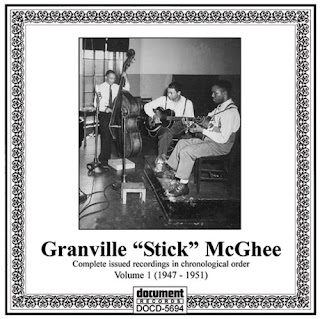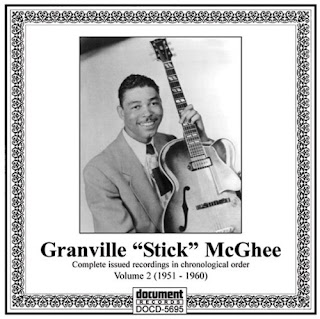Reviews originally published as a “Blues Bites” column in March 2013 for the About Blues website...
Granville “Stick” McGhee – Vol. 1 (1947-1951)
Granville “Stick” McGhee was the younger brother of folk-bluesman Brownie McGhee and while not as well known as his legendary sibling, his contributions to popular music remain arguably as influential as Brownie’s have come to be seen. “Stick” McGhee’s main claim to fame is the raucous “Drinkin’ Wine Spo-Dee-O-Dee,” originally waxed in 1947 for the independent Harlem Records label. The regional hit came to the attention of Ahmet Ertegun who, in 1949, was trying to get his fledgling Atlantic Records off the ground. Ertegun tracked down McGhee through his brother, and put them both in the studio with pianist Wilbur “Big Chief” Ellis to re-record the song with more dynamics and instrumentation. The Atlantic version of “Drinkin’ Wine Spo-Dee-O-Dee” would hit #2 on the R&B chart and break the Top 30 on the pop chart, providing both McGhee and Atlantic Records with a big hit.
As shown by Document Records’ Vol. 1 (1947-1951), which offers the “complete issued recordings in chronological order,” there was a lot more to Granville McGhee than his proto-rock ‘n’ roll novelty hit. McGhee was a skilled guitarist and a jazzy crooner who was flexible in performing a number of styles, from the early jump-blues of “Tall Pretty Woman (Blues)” with its wiry guitar licks and modified boogie piano, to the more traditional, Delta-tinged country-styled “Lonesome Road Blues,” and most everything in between. “Blue and Brokenhearted,” from 1949, is an early example of the quickly-evolving Chicago blues style, reminiscent of Big Bill Broonzy, while “Southern Menu” is a bluesy shuffle with blasts of horn that pre-dates 1950s-era R&B.
McGhee’s other enduring song was “One Monkey Don’t Stop No Show,” a 1972 hit for R&B group Honey Cone but has since been covered by a number of blues, rock, and R&B artists like Bobby Rush and Joe Tex. McGhee’s original is a rollicking, bluesy, rocking affair with flying piano keys, hot guitar licks, and blaring horns that drive the rhythm. McGhee’s “Wee Wee Hours” is another long-lost gem, a smoldering bluesy torch song that cries for rediscovery and a cover by an appropriately skilled contemporary crooner. Grade: B+ (Document Records, released January 8th, 2013)
Granville “Stick” McGhee – Vol. 2 (1951-1960)
McGhee’s Vol. 2 (1951-1960) picks up where the first volume leaves off, the talented singer and guitarist delivering one final red-hot single for Atlantic Records, 1951’s “Meet You In the Morning” featuring brother Brownie on vocals with “Stick” on shouted harmonies and guitar. The song itself is an early rocker with plenty of Jerry Lee Lewis-styled piano-pounding and a rowdy chorus that nevertheless sold poorly and resulted in a major step backwards for the artist. McGhee was working as a taxi driver when he recorded a pair or sides for the Essex Records label in Philadelphia, the A-side “My Little Rose” an unremarkable, poorly-recorded song overshadowed by the flip-side’s “No More Reveille,” a mid-tempo tune from Granville’s army days that highlights McGhee’s fluid guitar technique.
The bulk of Vol. 2 (1951-1960) comes from McGhee’s roughly five-year tenure with the notable King Records label in Cincinnati, which resulted in several lively jump-blues records. The storyline of “Whiskey Women and Loaded Dice” is pretty much self-explanatory, the thinly-recorded side nonetheless evincing a sly sense of humor and a playful vocal performance that dances across the R&B horns and rudimentary rhythm while the slow-grinding “Head Happy With Wine” is a swaggering, boozy song about drinking ones blues away. The best stuff on volume two is found among the sides McGhee cut for King in 1955, songs like “Six To Eight” and “Get Your Mind Out of the Gutter” displaying McGhee’s whiskey-worn, gruff vocals.
McGhee’s last recording would be 1960’s obscure “Money Fever” b/w “Sleep In Job,” released by the tiny Herald Records. Probably accompanied by Sonny Terry on harmonica and an unnamed rhythm section, McGhee delivers a pair of sizzling up-tempo rockers with semi-autobiographical lyrics and an infectious rhythm that should have been hits. Disillusioned with his treatment by King Records and the record industry on the whole, McGhee would only venture into the studio once more, to play a session behind his friend Terry. Retiring from music in 1960, sadly McGhee died a year later of cancer. If only for his handful of modest hits, McGhee should be remembered as an R&B trailblazer. Grade: B- (Document Records, released January 8th, 2013)
Roosevelt Sykes – “Live” At Webster College, St. Louis, 1974
The contributions of boogie-woogie pianist Roosevelt Sykes, a/k/a/ “The Honeydripper,” are often overshadowed by better-known students of his style like Pinetop Perkins and Otis Spann, but there’s no denying the influence the big man had on the evolution and use of the piano in blues music. Originally released as a limited-edition vinyl record back in 1988, Document’s “Live” At Webster College, St. Louis, 1974 captures the legendary pianist performing a raucous set in front of an enthusiastic young audience, Sykes banging away on the 88s and delivering upbeat readings of classic tunes like “St. James Infirmary Blues,” “On The Sunny Side of the Street,” and “Night Time Is the Right Time,” mixing up blues and jazz and boogie-woogie to the delight of the crowd.
Sykes injects a fair amount of humor into the performance, introducing the songs with stories from his 50+ years in the business, but the real key to Sykes’ longevity was his enormous love of life and playing music, which is readily apparent in his performance of “44 Blues.” His first hit song (from 1929) and now a standard of piano blues, Sykes’ fingers fly across the keys with undiminished elegance, his vocals drenched in emotion that is only bolstered by the mournful vibe of the instrumentation. That lively take on “44 Blues,” combined with Sykes’ energetic performance of “Pine Top’s Boogie Woogie,” his fingers dancing across the keyboard with joyful abandon, prove why Roosevelt Sykes remains a major influence on blues artists to this day. Grade: B+ (Document Records, released July 10th, 2012)




No comments:
Post a Comment